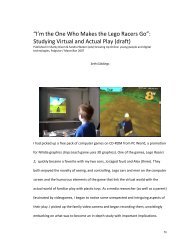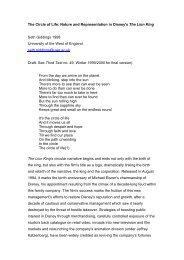Walkthrough: videogames and technocultural form - Seth Giddings
Walkthrough: videogames and technocultural form - Seth Giddings
Walkthrough: videogames and technocultural form - Seth Giddings
Create successful ePaper yourself
Turn your PDF publications into a flip-book with our unique Google optimized e-Paper software.
such with the game’s characters, not role-playing characters from a screen drama, for whilst they may choose<br />
to ‘be’ Yoshi, Luigi or Diddy Kong, the motive of this game is the enactment, or the translation, of the<br />
kinaesthetic dynamics of the videogame, its play between speed <strong>and</strong> ultra-speed, between item <strong>and</strong><br />
environment. They are playing at playing with virtual physics.<br />
How then should the videogame be analysed <strong>and</strong> studied? Videogames are, on one level, popular<br />
media, sets of images on a screen, <strong>and</strong> refracted through a transmedial prism into merch<strong>and</strong>ising, television<br />
cartoons, feature films. They are also computer technologies, both soft <strong>and</strong> hard, their hardware marketed as<br />
consumer electronic goods. They are games, play, <strong>and</strong> as such only exist in the moment or event of their<br />
playing. This thesis will study <strong>videogames</strong> as new media, noting the continuities with existing popular screen<br />
media, but also identifying the newness of new media <strong>and</strong> <strong>videogames</strong>, <strong>and</strong> exploring the analytical <strong>and</strong><br />
conceptual challenges this novelty throws down.<br />
Video games are a window onto a new kind of intimacy with machines that is characteristic of<br />
the nascent computer culture. The special relationship that players <strong>form</strong> with video games has<br />
elements that are common to interactions with other kinds of computers. The holding power of<br />
video games, their almost hypnotic fascination, is computer holding power' (Turkle 1984: 60)<br />
As Sherry Turkle indicates, whatever the newness of new media is, it is to do with their digital nature, their<br />
status as computer software <strong>and</strong> hardware, <strong>and</strong> the new <strong>form</strong>s of engagement <strong>and</strong> experience this nature<br />
facilitates. As the oldest popular new medium, the videogame should be central to the study of new media<br />
on the one h<strong>and</strong> precisely because of this longevity, accessibility <strong>and</strong> popularity, <strong>and</strong> on the other because, as<br />
Sherry Turkle asserts, their playing articulates the non-instrumental experiences, pleasures <strong>and</strong> intensities<br />
that characterise, in varying ways <strong>and</strong> to varying degrees, new media technoculture more generally.<br />
arguments<br />
So these little stories indicate much that will be explored throughout this thesis. A key concern is the role of<br />
digital technology <strong>and</strong> play in generating confusions or renegotiations between usually distinct concepts: in<br />
everyday life <strong>and</strong> media culture - the new with the old; in the use of computer media - virtual with actual<br />
space; in the moral critique of popular culture - passivity with agency. However this thesis is not only<br />
concerned with the conceptual, with the meanings constructed around computer media, but also the<br />
5




